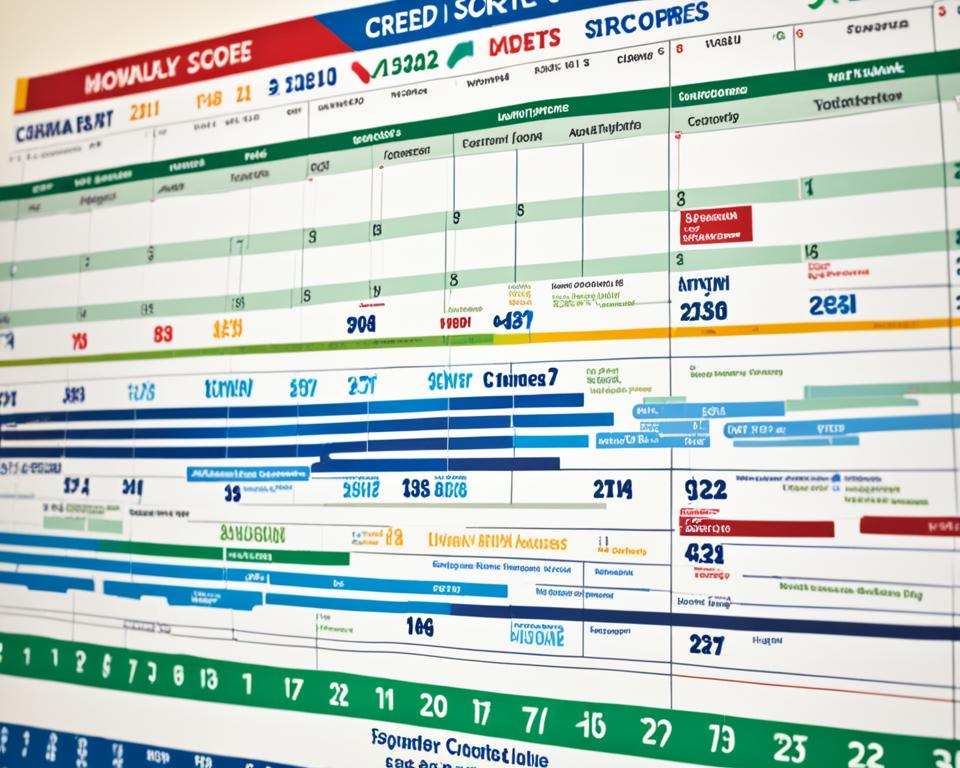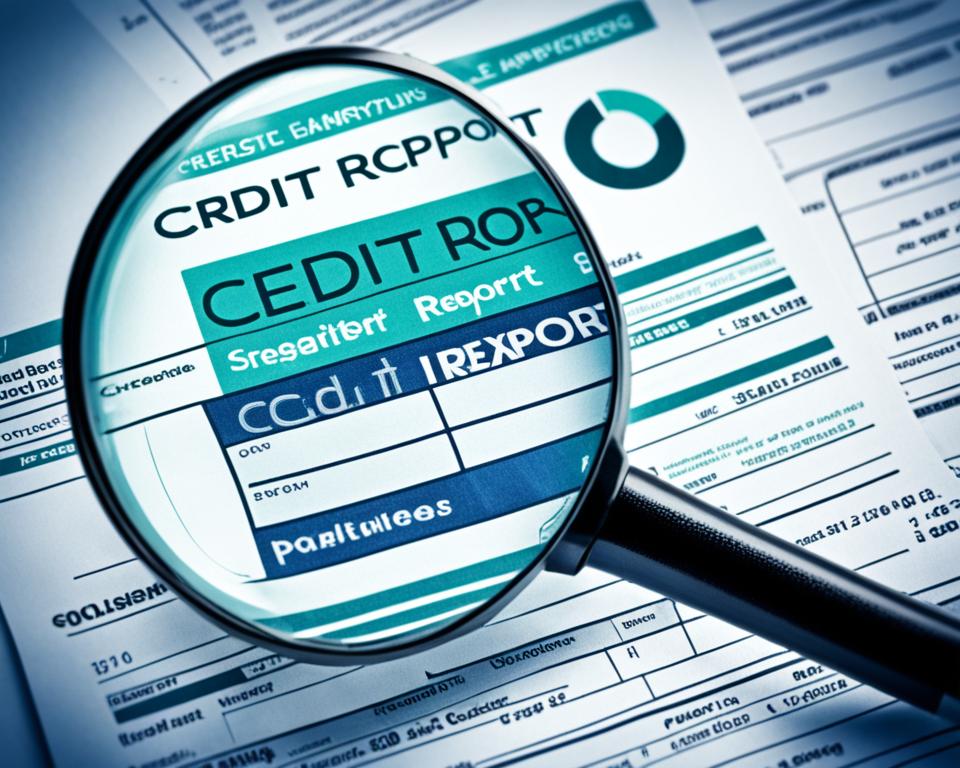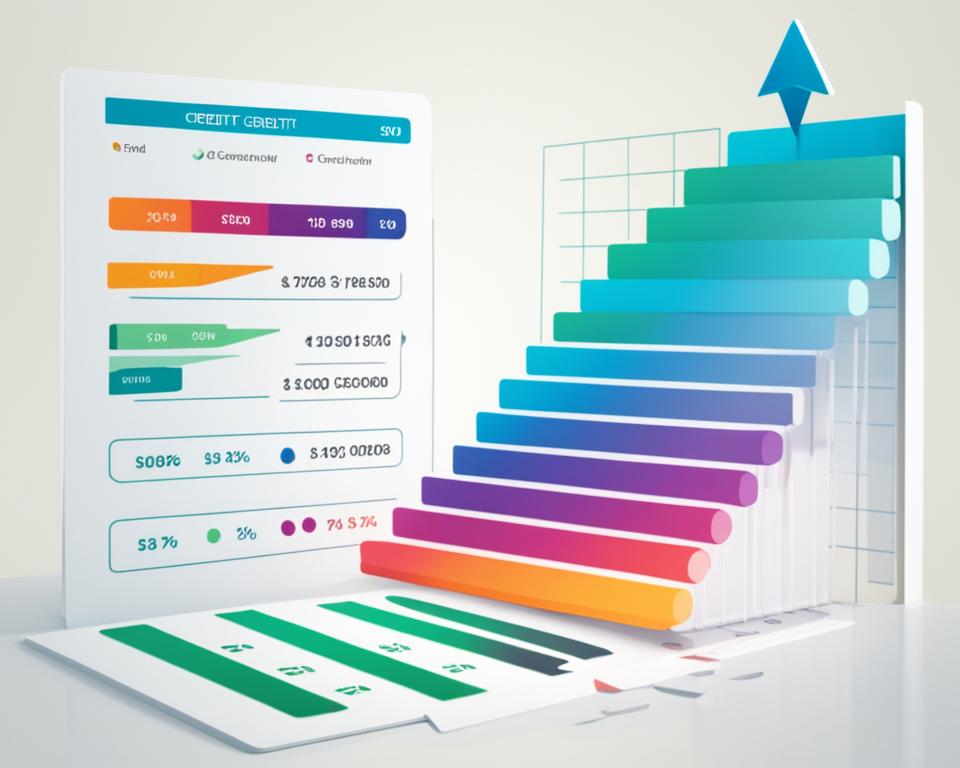Have you ever wondered when your credit score gets updated? Understanding the frequency and timing of credit score updates can help you stay informed about your financial standing. Credit scores are not fixed numbers and can change over time based on various factors.
Credit scores typically update at least once a month, but the actual frequency may vary. The timing of credit score updates depends on individual financial behavior and how often creditors report information to the consumer reporting agencies.
So, when can you expect your credit score to be updated? Let’s explore the factors that affect credit score updates and how lenders influence the timing of these updates.
Key Takeaways:
- Understanding when your credit score updates can help you stay informed about your financial standing
- Credit scores typically update at least once a month but can vary in frequency
- Updates depend on individual financial behavior and when creditors report information to consumer reporting agencies
- Lenders play a role in determining when credit score updates occur
- Monitoring your credit score regularly is essential for staying on top of your credit health
Factors Affecting Credit Score Updates
Credit scores are not static numbers. They constantly change based on the information reported to the consumer reporting agencies. Understanding the factors that affect credit score updates is crucial in maintaining good credit health and making informed financial decisions. Here are some key factors to consider:
Credit Score Refresh Rate
The credit score refresh rate refers to how often credit scores are updated. While credit scores typically update at least once a month, the actual frequency may vary. It depends on when creditors report new information to the credit bureaus and when the credit-scoring companies use that information to update the scores. Some credit-scoring models may update more frequently than others, but for most individuals, monthly updates are standard.
Update Credit Score Timeline
The update credit score timeline refers to the specific timing of when credit scores are updated. As mentioned earlier, credit scores can update monthly. However, it is important to note that credit scores do not update on a set day each month. The timing of credit score updates depends on when creditors report new information to the credit bureaus and when the bureaus update their reports. This means that credit scores can change at any time during the month, depending on when new information is reported.
Credit Score Reporting Cycle
The credit score reporting cycle is closely tied to when lenders report credit information to the consumer reporting agencies. Lenders have the discretion to decide when and how often they will report credit information. Generally, lenders report on a monthly basis. However, the specific reporting schedule may vary for each lender. Some lenders may report information more frequently, while others may report less frequently or not at all. Additionally, not all lenders report information to all three major credit bureaus. This means that credit reports and scores may differ depending on the bureau used.
To visualize the factors affecting credit score updates, here is a table summarizing key points:
| Factors | Description |
|---|---|
| Credit Score Refresh Rate | Credit scores typically update at least once a month, but the actual refresh rate may vary. |
| Update Credit Score Timeline | Credit scores do not update on a set day each month. The timing depends on when new information is reported. |
| Credit Score Reporting Cycle | Lenders decide when and how often they report credit information to the consumer reporting agencies. Reporting schedules may vary. |
Understanding these factors can help individuals better manage their credit health and make informed financial decisions. It is important to regularly monitor credit reports and scores to stay updated on any changes and maintain good credit standing.
Note: The table below shows the factors affecting credit score updates.
Credit Score Updates and Lenders
Lenders play a crucial role in determining when and how often credit score updates occur. Understanding their reporting schedule and decisions is essential for individuals to stay informed about their credit health. Let’s delve into how lenders impact credit score updates.
Most lenders report updated information to credit bureaus on a monthly basis. However, it’s important to note that each lender has its own reporting schedule. This means that the timing of credit score updates may vary depending on the lender’s reporting practices. Some lenders may choose to report information more frequently, while others may have a longer interval between reporting periods.
Credit card companies often report information based on a recurring date known as the billing cycle or statement date. This means that if a credit cardholder’s billing cycle ends on the 15th of each month, the lender will typically report the updated credit information shortly after that date. This information is then used to update the individual’s credit score.
However, not all lenders report information to all three major credit bureaus—Experian, Equifax, and TransUnion. Some lenders may report to only one or two of these bureaus, while others may choose not to report information at all. This can result in different credit scores across the bureaus, highlighting the importance of regularly checking and monitoring credit information from all three bureaus.
It’s worth noting that lenders have the discretion to decide if and when they will report information. This means that even if an individual makes timely payments or improves their credit utilization, the credit score may not immediately reflect these positive changes. Lenders may have their own internal processes and timings for reporting updates to the credit bureaus, which can lead to a delay in the credit score updates.
Key Takeaways:
- Lenders typically report updated information on a monthly basis, although the specific reporting schedule varies for each lender.
- Credit card companies report information based on the billing cycle or statement date.
- Not all lenders report information to all three major credit bureaus, which can result in different credit scores across bureaus.
- Lenders have the discretion to decide if and when they will report information, which may cause delays in credit score updates.
To better understand how lenders impact credit scores, it’s important to explore the relationship between lenders and credit bureaus. This will shed light on how credit information is transmitted and utilized in determining credit scores.

Frequency of Credit Score Updates
Credit scores are dynamic and subject to regular updates based on changes in an individual’s credit report. While credit scores generally update at least once a month, the frequency can vary depending on various factors, including the number of lenders an individual has and when each lender reports new information.
For those with multiple lenders or financial products, credit score updates may be more frequent as each lender provides updated information to the credit bureaus. This can result in a more dynamic credit score that reflects recent financial activity.
It is important to note that credit scores do not update on a set day each month. The update timing depends on when lenders send information to the credit bureaus and when the bureaus update their reports. Therefore, the specific update dates can vary from person to person.
| Factors Impacting Credit Score Update Frequency | Interpretation |
|---|---|
| Number of Lenders | The more lenders an individual has, the more frequent the credit score updates can be. |
| Lender Reporting Practices | Each lender decides when and how often they report information to the credit bureaus, which affects the credit score update frequency. |
| Credit Bureau Update Schedule | Credit bureaus update their reports based on when they receive information from lenders, impacting the credit score update timing. |
In summary, credit scores generally update monthly, but the frequency can vary based on the number of lenders and their reporting practices. Monitoring credit score updates regularly can provide individuals with a clearer understanding of their current credit health and help them make informed financial decisions.
Requesting a New Credit Score
To stay informed about any changes in your credit score, it’s important to request a new copy of your credit score regularly. By monitoring your credit score, you can keep track of any updates and make informed decisions about your financial future.
Equifax Core Credit™ offers a free monthly VantageScore® 3.0 credit score and Equifax credit report. With this service, you can easily access your credit information and see if there have been any recent changes to your credit score.
Requesting a new credit score allows you to have the most up-to-date information on your credit standing. Whether you’re planning to make a big purchase or just want to stay on top of your credit health, monitoring your credit score regularly is essential.
Monitor Your Credit Score Changes
Monitoring your credit score is essential for staying aware of any changes and ensuring your financial stability. By regularly checking your credit score, you can:
- Keep track of your credit health
- Identify any suspicious or unauthorized activity
- Respond quickly to any errors or discrepancies
- Take action to improve your credit score
By taking an active role in monitoring your credit score, you can protect yourself from identity theft, ensure the accuracy of your credit information, and maintain a healthy credit standing.
Remember, your credit score is a reflection of your financial responsibility and can impact your ability to secure loans, obtain favorable interest rates, and more. Regularly checking your credit score allows you to take control of your financial future and make informed decisions regarding your creditworthiness.

Benefits of Requesting Updated Credit Scores
| Benefits | Explanation |
|---|---|
| Track changes | Stay updated on any improvements or declines in your credit score |
| Identify issues | Quickly identify any discrepancies or errors that could impact your creditworthiness |
| Take control | Empower yourself to take action and make informed financial decisions |
| Protect against fraud | Monitor for unauthorized activity and potential identity theft |
Credit Score Updates and Applications
Applying for loans or credit cards necessitates a careful consideration of credit scores and their potential fluctuations. It’s crucial to recognize that credit scores can change even after they have been checked. Various factors on credit reports, such as new balances, bill payments, and account openings, can exert an influence on credit scores, causing them to fluctuate before submitting an application.
When individuals check their credit scores in preparation for a loan or credit card application, they need to be aware that the scores may change during the application process. The information contained in credit reports is dynamic, constantly updating as financial activities occur. Consequently, it is possible for credit scores to change between the time of checking and submitting the application.
For instance, if an individual has recently made a large purchase using credit or opened a new credit account, these actions can lead to changes in their credit score. Similarly, missing or making late payments can also impact the credit score negatively. Therefore, it is vital for individuals to recognize that credit scoring is an ongoing process, and factors on credit reports can have a direct influence on credit scores when applying for credit or loans.
To better understand the impact of credit score changes before applications, let’s take a look at an example:
John plans to apply for a mortgage in the near future. He checks his credit score and finds that it is in the “Excellent” range. Feeling confident, he proceeds with the mortgage application process. However, during the application process, John opens a new credit card and realizes that his credit score has slightly decreased. This slight decrease may impact the mortgage terms he qualifies for, potentially resulting in higher interest rates or stricter loan terms.
It is advisable for individuals to monitor their credit scores regularly to stay informed about any changes that might occur prior to submitting applications. Being proactive in managing credit and maintaining financial responsibility can help individuals improve their creditworthiness and increase the likelihood of favorable loan or credit card terms.
By staying vigilant about credit score changes and maintaining good credit health, individuals can make informed decisions when applying for credit or loans. Regularly checking credit reports and monitoring credit scores provides valuable insights that allow individuals to adjust their financial behaviors accordingly and position themselves favorably in the eyes of lenders.
For a visual representation, refer to the following table:
| Date | Credit Score | Change |
|---|---|---|
| Opening New Credit Card | 750 | -10 |
| Missed Payment | 740 | -10 |
| Payment Made On Time | 750 | +10 |
| New Balance Reported | 760 | +10 |
Table: Changes in Credit Score Before and After Application
As demonstrated in the table, credit scores can fluctuate based on various factors leading up to the application process. It is essential for individuals to be aware of these potential credit score changes and to adapt their financial behaviors accordingly before applying for loans or credit cards.
Checking Credit Score for Free
When it comes to monitoring your credit health, checking your credit score is an essential step. Fortunately, there are numerous resources available that allow you to check your credit score for free. This section will explore different credit score services that offer this valuable feature.
Many credit card issuers provide their cardholders with free access to credit scores. Some of the major credit card companies, such as American Express, Capital One, and Discover, offer this service as part of their cardholder benefits. By logging into your credit card account, you can easily view your credit score and stay up to date with any changes.
In addition to credit card issuers, credit bureaus also offer free credit score services. One prominent credit bureau that provides this service is Experian. Through Experian Free Credit Score, you can access and monitor your credit score without any cost. Simply sign up for an account on their website to get started.
It is important to note that different credit score services may work with different credit bureaus. This can lead to variations in credit scores obtained from different sources. However, the overall trend and key factors affecting your credit score should remain relatively consistent.
To give you a better understanding of the different credit score services available, here is a comparison table:
| Service | Credit Bureau | Access Method |
|---|---|---|
| Credit Card Issuers | Varies (e.g., FICO or VantageScore) | Online account |
| Experian Free Credit Score | Experian | Online account |
Note: This table is not exhaustive and serves as an example. There are other credit score services available as well.
By taking advantage of these free credit score services, you can stay informed about your credit health and track any changes that may impact your financial decisions. Regularly checking your credit score is a crucial step towards maintaining a healthy credit profile.
Rapid Rescoring and Credit Score Updates
Rapid rescoring is a powerful tool that can expedite the credit score updating process, particularly in relation to mortgages. This process allows lenders to add new repayment details to credit reports, resulting in faster credit score updates. However, it’s important to note that rapid rescoring can only be initiated through a lender and is typically applicable to specific situations.
For other scenarios, such as paying off debts or resolving credit issues, the timeline for credit score updates remains unchanged. The rapid rescoring process focuses primarily on updating credit scores with updated mortgage payment information, making it an effective method for speeding up credit score updates in those particular instances.
In summary, rapid rescoring is a specialized method that can accelerate the credit score updating process for mortgage-related information. To take advantage of this process, individuals must request it through their lender. For other credit-related actions and updates, the usual timeframes for credit score updates apply.
Factors Influencing Credit Score Changes
The credit score is a numerical representation of an individual’s creditworthiness and is influenced by various factors. Understanding these factors can help individuals make informed financial decisions and take actions to improve their credit scores.
Payment History
An individual’s payment history is one of the most important factors considered in credit score calculation. Consistently making on-time payments for credit accounts, such as loans and credit cards, demonstrates responsible financial behavior and can positively impact the credit score.
Existing Debt
The amount of debt an individual has, particularly the utilization of credit limits, plays a significant role in credit score calculation. Keeping debt levels low and maintaining a healthy credit utilization ratio can have a positive effect on the credit score.
Credit Age
The length of an individual’s credit history is also taken into account when calculating the credit score. Having a longer credit history demonstrates experience in managing credit and can be beneficial for the credit score.
Credit Mix
The types of credit accounts an individual has can impact the credit score. A diverse credit mix, including revolving credit accounts (e.g., credit cards) and installment loans (e.g., mortgages, car loans), can reflect a balanced approach to credit management and may positively influence the credit score.
New Credit Applications
The frequency of new credit applications can also affect the credit score. Multiple credit applications within a short period may raise concerns about financial stability and can have a negative impact on the credit score.
| Factors | Influence on Credit Score |
|---|---|
| Payment History | Positive impact when consistently making on-time payments |
| Existing Debt | Keeping debt levels low can positively influence the credit score |
| Credit Age | Having a longer credit history can be beneficial for the credit score |
| Credit Mix | A diverse credit mix may positively affect the credit score |
| New Credit Applications | Multiple credit applications within a short period can negatively impact the credit score |
Understanding the factors that influence credit score changes allows individuals to assess their current credit situation and make adjustments to improve their creditworthiness. By responsibly managing payment obligations, keeping debt levels in check, maintaining a longer credit history, diversifying credit accounts, and minimizing new credit applications, individuals can work towards achieving and maintaining a healthy credit score.
Checking Credit Reports
Regularly monitoring credit reports is an essential practice for maintaining good credit health. By checking credit reports, individuals can identify errors and potential signs of identity theft. It is recommended to check credit reports at least once a year to stay updated on their overall credit status.
To obtain a free copy of their credit report, individuals can visit AnnualCreditReport.com. This website allows users to access their credit reports from the three major credit bureaus: Equifax, Experian, and TransUnion.
Checking credit reports serves multiple purposes. It allows individuals to review their credit history, verify the accuracy of reported information, and ensure that all accounts and transactions are legitimate. Here are some key reasons why regularly monitoring credit reports is important:
- Identifying errors: Credit reports may contain inaccuracies or errors in personal information, account balances, payment history, or other details. Spotting these errors early is crucial for addressing them promptly and preventing any negative impact on credit scores and overall creditworthiness.
- Detecting identity theft: Unusual activity or unfamiliar accounts listed on credit reports can be indicators of identity theft. By monitoring credit reports, individuals can identify suspicious transactions or accounts and take necessary steps to protect their identity.
- Tracking credit health: Regularly checking credit reports allows individuals to assess their credit health and monitor their progress over time. It provides insights into factors influencing credit scores and helps individuals make informed financial decisions.

Staying vigilant in checking credit reports helps individuals maintain control over their financial well-being and protect themselves against any potential threats. By taking proactive measures and regularly reviewing credit reports, individuals can ensure the accuracy of their credit information and take appropriate action whenever necessary.
Frequency of Checking Credit Scores
Monitoring your credit score is an essential part of maintaining your financial health. Luckily, checking your credit score has never been easier or more accessible. You can check your credit score as often as you’d like, thanks to the many free score-checking services available online. Best of all, checking your credit score does not impact your credit standing, so you have peace of mind knowing that your frequent checks won’t negatively affect your score.
While there is no specific rule for how often you should check your credit score, it is generally recommended to monitor it regularly. By doing so, you can stay on top of any changes or discrepancies that may occur, helping you maintain a healthy credit profile.
Regularly checking your credit score allows you to:
- Monitor the state of your credit health
- Identify any errors or inaccuracies on your credit report
- Take timely action to address any issues that may impact your creditworthiness
- Stay informed of your progress in reaching your financial goals
Remember, your credit score is a snapshot of your creditworthiness at a given moment. By checking your credit score regularly, you can ensure that it accurately reflects your financial habits and take steps to improve it if necessary.
Keeping Your Credit Health in Check
Monitoring your credit score is just one aspect of maintaining your credit health. It is important to engage in other credit-conscious behaviors, such as:
- Pay your bills on time: Timely bill payments demonstrate responsible financial behavior and positively impact your credit score.
- Manage your debt: Keep your credit utilization low by managing your debts and paying them off responsibly.
- Maintain a healthy credit history: A longer credit history can boost your credit score, so try to keep your old credit accounts open.
- Diversify your credit mix: Having a mix of different types of credit, such as credit cards and loans, can improve your credit score.
- Avoid excessive new credit applications: Applying for multiple lines of credit within a short period can negatively impact your credit score.
By combining regular credit score checks with these proactive credit habits, you can maintain a strong credit profile and improve your overall financial well-being.
Interpreting Credit Scores
Credit scores play a crucial role in determining an individual’s creditworthiness and can provide valuable insights into their financial health. These scores fall within different categories, each indicating a different level of creditworthiness. Understanding these credit score interpretations can help individuals gauge their financial standing and make informed decisions.
Creditworthiness Categories
When it comes to credit scores, higher numbers generally represent stronger creditworthiness. While the specific credit score ranges may vary depending on the scoring model used, here is a general breakdown of creditworthiness categories:
| Credit Score Range | Creditworthiness Category |
|---|---|
| 800 and above | Exceptional |
| 740 – 799 | Very Good |
| 670 – 739 | Good |
| 580 – 669 | Fair |
| Below 580 | Poor |
These creditworthiness categories are just a general guideline, and individual lenders may have their own criteria for evaluating creditworthiness. However, having a higher credit score typically indicates a lower risk for lenders and can potentially lead to more favorable terms for loans, credit cards, and other financial products.
It’s important to note that creditworthiness categories are not absolute and can vary based on the specific scoring model used by lenders or credit-scoring companies. Additionally, other factors such as income, employment history, and debt-to-income ratio may also be considered in assessing an individual’s creditworthiness.
Monitoring and understanding credit scores can empower individuals to take control of their financial well-being and make informed decisions to improve their creditworthiness.

Conclusion
In conclusion, credit scores are dynamic and subject to change based on the information in credit reports and the reporting schedules of lenders. Regularly monitoring credit scores and requesting updated credit reports are crucial for effectively managing and maintaining good credit health. By understanding the factors that influence credit score changes, individuals can make informed financial decisions and take steps to improve their creditworthiness.
It is important to remember that credit score updates do not occur on a set schedule and can vary based on individual circumstances. Credit scores generally update at least once a month, but the frequency may differ depending on when creditors report new information to the credit bureaus. This variability highlights the need for ongoing monitoring to stay informed about any changes in credit scores.
For individuals seeking to improve their credit health, it is essential to prioritize responsible financial behaviors such as making timely payments, managing debt effectively, and maintaining a diverse credit mix. Additionally, minimizing new credit applications and regularly checking credit reports can help identify errors and prevent identity theft.
FAQ
When does a credit score update?
Credit scores update when there are changes in the information reported to the credit bureaus.
What factors affect credit score updates?
Credit score updates can be influenced by various factors such as the timing of credit reports, the frequency of reporting by creditors, and the individual’s financial behavior.
How do lenders impact credit score updates?
Lenders have the discretion to decide when and how often they will report credit information to the credit bureaus, which can affect the frequency of credit score updates.
How frequently do credit scores update?
Credit scores typically update at least once a month, but the frequency can vary depending on several factors, including the number of lenders an individual has and when each lender reports new information.
How can I request a new credit score?
To see any changes in your credit score, you can request a new copy of your credit score and credit report from free credit score services or credit bureaus.
Can credit scores change before submitting an application?
Yes, credit scores can change between the time of checking and submitting an application due to updated credit information that can influence credit scores.
Where can I check my credit score for free?
Many credit card issuers provide free access to credit scores for their customers, and credit bureaus also offer free credit score services.
How does rapid rescoring affect credit score updates?
Rapid rescoring is a process used by lenders to add new repayment details to credit reports, which can speed up credit score updates but needs to be requested through a lender.
What factors can impact credit score changes?
Factors such as payment history, existing debt, credit age, credit mix, and new credit applications can all affect credit scores and cause them to change.
How often should I check my credit report?
It is advisable to check your credit report at least once a year to identify possible errors that could indicate identity theft and to stay updated on your overall credit health.
How frequently can credit scores be checked?
Credit scores can be checked as often as desired using free score-checking services, as it does not impact credit scores. Regular monitoring is recommended to maintain credit health.
How do I interpret my credit score?
Credit scores measure creditworthiness and can be categorized as exceptional, good, fair, or poor depending on the scoring model used.
What is the conclusion about credit score updates?
Monitoring credit score updates regularly and understanding the factors that influence changes can help individuals make informed financial decisions and maintain good credit health.





